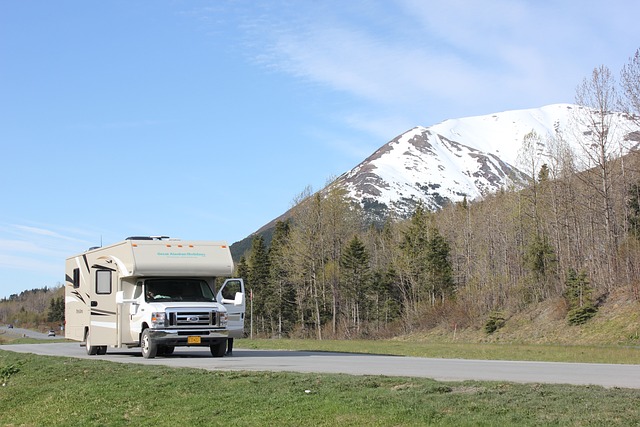2023 has seen a surge in individuals embracing RVing for Beginners as an adventurous yet comfortable travel option. This year, the focus has been on equipping new RVers with the essential knowledge and skills to ensure their journeys are both enjoyable and safe. Key areas include understanding RV systems like plumbing, electrical, and propane, ensuring proper setup for stability, and selecting appropriate campgrounds that cater to rookie RVers' needs. Safety is a cornerstone of RVing for Beginners, encompassing knowledge of local laws, weather patterns, and road safety, as well as performing regular maintenance checks to prevent on-road issues. Emergency preparedness is non-negotiable, with essential kits and tools necessary for unexpected situations, especially in less serviced areas or during adverse weather. Engaging with the RVing community through digital platforms can provide both practical advice and a supportive network. For beginners, advance preparation is crucial, including thorough route planning that considers vehicle dimensions, rest areas, and campsite safety, as well as selecting reputable campgrounds that offer security and amenities. Safety measures on the road, such as adapting to different road types and conditions, and vigilance in camp setup and personal activities off the RV, are essential for a trouble-free and enriching experience. Emergency preparedness, understanding of local laws and regulations, and regular vehicle maintenance further underscore the importance of being well-prepared for a successful RVing journey, especially for those new to RVing for Beginners.
Embarking on an RV journey offers unparalleled freedom and adventure, with the great outdoors as your backyard. To ensure this experience is as safe and enjoyable as possible, it’s crucial to prepare thoroughly. This comprehensive guide for RVing for Beginners covers essential safety tips, from pre-trip maintenance to emergency preparedness. Learn how to plan your route securely, maintain your RV for optimal performance, and adopt best practices on the road. With the right knowledge and precautions, you can transform your RV travel into a secure and memorable expedition.
- Understanding the Basics of RVing for Beginners: A Safe Start on Your Journey
- Pre-Trip Essentials: RV Maintenance and Safety Checks to Ensure a Smooth Departure
- Route Planning and Stops: Strategies for Secure Travel and Ideal Campground Selection
- On-the-Road Best Practices: Navigating with Caution, Staying Alert, and Managing Risks
- Emergency Preparedness: What RV Travelers Need to Know for Safe Handling of Unforeseen Situations
Understanding the Basics of RVing for Beginners: A Safe Start on Your Journey

Embarking on an RV journey offers a unique blend of adventure and comfort, making it an increasingly popular travel option. For those who are new to RVing for Beginners, it’s crucial to familiarize oneself with the essential aspects of RV travel to ensure a secure and enjoyable experience. Firstly, understanding the layout and features of your RV is paramount. This includes knowing how all the systems—from plumbing to electrical to propane—function and where to access them for maintenance or in case of an emergency. It’s also important to be adept at leveling your RV, which ensures stability and comfort during your stay. Additionally, novice travelers should learn about the various types of campgrounds available, from full-hookup sites to dry camping locations, and select one that suits their needs and the capabilities of their RV.
Safety in RVing for Beginners is multifaceted; it extends beyond the vehicle itself to include knowledge of local regulations, weather conditions, and road safety. Regular maintenance checks are essential to prevent unexpected issues on the road. Travelers should also keep emergency kits both in the RV and in their personal belongings, including first aid supplies, fire extinguishers, and tools for minor repairs. It’s wise to have a clear understanding of your route, with backup options in place, especially during inclement weather or in areas with less frequent services. Finally, staying connected with the RVing community through online forums or apps can provide valuable insights and assistance, fostering a sense of camaraderie and shared knowledge that can enhance the safety and satisfaction of your RV travels.
Pre-Trip Essentials: RV Maintenance and Safety Checks to Ensure a Smooth Departure

When embarking on an RVing adventure, especially for beginners, thorough preparation is key to ensuring a smooth and secure journey. Before hitting the road, RVers should conduct comprehensive maintenance checks on their vehicles. This includes verifying the integrity of tires, brakes, and all critical systems such as the electrical, plumbing, propane, and battery systems. Regular inspection and replacement of smoke and carbon monoxide detectors are non-negotiable for early hazard detection. Similarly, ensuring that all safety gear—including fire extinguishers, first aid kits, and emergency supplies—is fully stocked and functional is crucial. Beginners should familiarize themselves with the RV’s manual to understand its features and limitations, as well as to know how to operate and troubleshoot any issues that may arise during travel. Properly maintaining your RV and performing these safety checks prior to departure will not only enhance your experience but also significantly reduce the risk of encountering avoidable problems on the road. By taking these pre-trip essentials seriously, RVers can set off confidently, ready to enjoy the many wonders that await them in the great outdoors.
Route Planning and Stops: Strategies for Secure Travel and Ideal Campground Selection

When embarking on an RVing journey, particularly for beginners, meticulous route planning is paramount to ensure a secure and enjoyable travel experience. Beginners should leverage resources like GPS systems designed for RVs, which account for the vehicle’s size and provide alerts for low clearance areas or weight restrictions on roads. Additionally, it’s wise to map out rest stops and campsites in advance, considering factors such as proximity to emergency services, accessibility of facilities, and terrain suitability for RVs. Campground selection should be guided by researching the amenities provided, previous visitor reviews, and the campground’s reputation for security. Optimal campgrounds offer well-lit areas, secure storage options for valuables, and a friendly, communal atmosphere that deters unwanted activity. By choosing established and well-maintained campgrounds within RVing communities, new travelers can navigate their route with confidence, knowing they have a comfortable and secure place to rest for the night. Prioritizing safety in route planning and campground selection is a critical aspect of RVing for Beginners that contributes to a trouble-free and rewarding adventure.
On-the-Road Best Practices: Navigating with Caution, Staying Alert, and Managing Risks

When embarking on RVing adventures, beginners and seasoned travelers alike must prioritize safety to ensure a secure journey. Navigating unfamiliar roads requires heightened alertness; always be mindful of road conditions, construction zones, and the size and handling characteristics of your RV. Adjust your speed accordingly and maintain a safe following distance to avoid potential accidents. It’s imperative to plan your routes in advance, considering daylight hours and rest stops, to minimize the risks associated with driving at night or in less traveled areas. Additionally, staying informed about weather patterns is crucial; adverse conditions can drastically alter driving safety and accessibility of certain destinations. Regular maintenance checks on your RV’s systems, including brakes, tires, and lights, are non-negotiable for maintaining a safe travel environment.
Staying alert also involves being aware of your surroundings, especially when parking or setting up camp. Choose well-lit, secure areas and consider investing in security systems for your RV. Keep all valuables out of sight and ensure the RV doors and windows are locked. When exploring your destination, be mindful of your personal safety; inform someone of your itinerary and return times, and never leave your belongings unattended. Understanding local laws and regulations is essential for avoiding legal troubles that could jeopardize your trip. Lastly, always have an emergency plan in place, including a first aid kit, fire extinguisher, and knowledge of nearby medical facilities. By adhering to these on-the-road best practices, RVing for Beginners can confidently navigate their journeys with caution, stay alert, and manage risks effectively.
Emergency Preparedness: What RV Travelers Need to Know for Safe Handling of Unforeseen Situations

When embarking on an RV journey, it’s crucial to be prepared for emergencies that may arise during your travels. RVing for Beginners should familiarize themselves with their vehicle’s systems, including the propane, electrical, and plumbing setups, to mitigate potential issues swiftly. Having a well-stocked emergency kit is a non-negotiable, containing essential supplies like first aid materials, fire extinguishers, flashlights, batteries, and multi-tools. Additionally, travelers should have a clear understanding of their RV’s breakdown procedures, including locating and knowing how to use the emergency shutoff valves for water, propane, and electricity. It’s also wise to keep critical contact information accessible, such as roadside assistance, insurance providers, and local emergency services.
Beyond the basics, RV travelers should consider enrolling in a first aid course tailored to RVing scenarios. This training can equip you with the necessary skills to handle medical emergencies on the road. RVing for Beginners should also invest time in learning about the areas they plan to visit, including local weather patterns and any potential hazards like flood zones or areas prone to wildfires. Having a solid plan for regular maintenance checks before departing can prevent many emergencies from occurring. Furthermore, travelers should regularly update their emergency plan, ensuring it reflects their latest route, destinations, and any changes in their RV setup. Staying informed, prepared, and proactive will significantly enhance the safety of your RV travels.
prioritize your safety and enjoyment while RVing, it’s crucial to heed the advice outlined in this guide. From mastering the basics of RVing for beginners to conducting thorough pre-trip essentials checks, careful route planning, and maintaining on-the-road best practices, every step is designed to enhance your journey. Additionally, being well-prepared for emergencies ensures that you can handle unexpected situations with confidence. Remember to stay informed about the latest safety guidelines and continually assess potential risks. With these strategies in mind, you’ll be set for a secure and memorable RV adventure. Happy travels!
